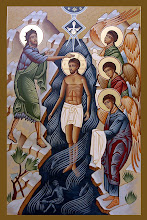Win Some and Lose Some
Hey all. It's been a long time since I've posted anything of substance, so I'm going to give a general update.
First year at seminary went fine. I mostly got A's, but I was a little disappointed with my Gospels I, II grades, which were both B's. However, I managed to get an A from Dr. Nordling (I think the only one he's given since he's been at Concordia) on my paper regarding the Words of Institution in Matthew's Gospel. I also got B's in Hebrew I and II. Aside from that, I loved my history and exegetics classes. I was a little disappointed by the systematic and liturgical classes though.
However, after my first year of seminary, I've come to the conclusion that ordination is not for me. I've begun the process of switching out of the MDiv program and pursuing academic interests in historical theology. As a result I'll graduate next year with an MA in Religion. Due to some recent discussions with Calvinists, I'm anxious to work on the theology of the sixth ecumenical council and St. Maximus the Confessor. I've become convinced that at times when referring to the natures of Christ, Calvinists tend to the Nestorian, but when it comes to the will, they are Monothelites, which is itself an extension of Monophysitism and ultimately a form of Apolinarianism.
I met a lot of good people at seminary, but sadly, two of my close friends are doing years in the study abroad program. Matt Moss will be in England and Travis Berg will be in Germany. Mike Miller gets married this Summer (though since I can't find a job to save my life I don't know if I'll be able to make it). I reconnected with a friend from University who teaches Paleontology at Duke in Oklahoma, and he ardently discusses the creation/evolution debate.
Aside from theological discoveries, I have to admit that aside from Christology, I'm not learning a whole lot about systematics (even in that class a lot was review for me). I learned more systematics in church history I.
This Summer, if I can't find a job, I'll be reading and reviewing my languages and history, but also making movies on youtube...especially since I've found a text-to-speech program that lets you make 6 minute cartoons in less than an hour. I'm in the middle of doing a series on the history of Christology, aimed at explaining to Calvinists why some of us accuse them of Christological difficulties at times.
The only thing I'm going to ask for prayer is for a family member very close to me that has cancer. We've caught it early, but prayer is always good in this situation.
Glory to God for all things.
First year at seminary went fine. I mostly got A's, but I was a little disappointed with my Gospels I, II grades, which were both B's. However, I managed to get an A from Dr. Nordling (I think the only one he's given since he's been at Concordia) on my paper regarding the Words of Institution in Matthew's Gospel. I also got B's in Hebrew I and II. Aside from that, I loved my history and exegetics classes. I was a little disappointed by the systematic and liturgical classes though.
However, after my first year of seminary, I've come to the conclusion that ordination is not for me. I've begun the process of switching out of the MDiv program and pursuing academic interests in historical theology. As a result I'll graduate next year with an MA in Religion. Due to some recent discussions with Calvinists, I'm anxious to work on the theology of the sixth ecumenical council and St. Maximus the Confessor. I've become convinced that at times when referring to the natures of Christ, Calvinists tend to the Nestorian, but when it comes to the will, they are Monothelites, which is itself an extension of Monophysitism and ultimately a form of Apolinarianism.
I met a lot of good people at seminary, but sadly, two of my close friends are doing years in the study abroad program. Matt Moss will be in England and Travis Berg will be in Germany. Mike Miller gets married this Summer (though since I can't find a job to save my life I don't know if I'll be able to make it). I reconnected with a friend from University who teaches Paleontology at Duke in Oklahoma, and he ardently discusses the creation/evolution debate.
Aside from theological discoveries, I have to admit that aside from Christology, I'm not learning a whole lot about systematics (even in that class a lot was review for me). I learned more systematics in church history I.
This Summer, if I can't find a job, I'll be reading and reviewing my languages and history, but also making movies on youtube...especially since I've found a text-to-speech program that lets you make 6 minute cartoons in less than an hour. I'm in the middle of doing a series on the history of Christology, aimed at explaining to Calvinists why some of us accuse them of Christological difficulties at times.
The only thing I'm going to ask for prayer is for a family member very close to me that has cancer. We've caught it early, but prayer is always good in this situation.
Glory to God for all things.






